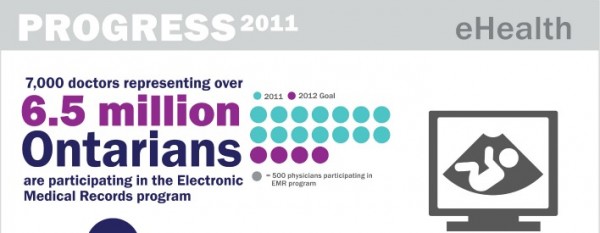All Canadians in Ontario will have electronic health records by 2015.
Currently, more than 7,000 doctors – caring for 6.5 million Ontarians – are participating in the Electronic Medical Records program.
Furthermore, patients will own their electronic health records which will allow them to take better control of their health.
These relatively new ehealth initiatives as outlined in the 2011 eHealth Progress Report will provide the following benefits for all involved because effective and efficient electronic health info management by doctors saves lives and money, and improves patient care:
- 24/7 remote access to neurologists which has prevented the transfer of 2,400 trauma patients and saved over $50 million.
- For the first time, all hospitals are able to take diagnostic images such as x-rays and MRIs (Magnetic Resonance Imagaings) digitally and store them in a central location that can be accessed electronically.
- Doctors and nurses in every ER have access to information about the drugs used by seniors – helping to avoid adverse drug reactions.
- reduce wait times, duplication and unnecessary tests, and
- put a stop to avoidable prescription drug errors.
Also, 700 Greater Toronto Area service providers will be able to share electronic health information by 2013.
Please click here for more info about eHealth Ontario.

Ontario, Canada: Newsroom
News Release
On Track To Provide Better Health For All Ontarians
August 19, 2011
McGuinty Government Releases e-Health Progress Report
More than 7,000 doctors, who care for 6.5 million Ontarians, now manage their patients’ health information with an electronic medical record.That is just some of the significant progress outlined in the 2011 eHealth Progress Report.Ontario is committed to electronic health because it saves lives and money, and improves care. Achievements include:
- 24/7 remote access to neurologists which has prevented the transfer of 2,400 trauma patients and saved over $50 million.
- For the first time, all hospitals are able to take diagnostic images such as x-rays and MRIs digitally and store them in a central location that can be accessed electronically.
- Doctors and nurses in every ER have access to information about the drugs used by seniors – helping to avoid adverse drug reactions.
Increasingly, electronic health records will help us drive down wait times, reduce duplication and unnecessary tests, and put a stop to avoidable prescription drug errors.
All Ontarians will have an electronic health record by 2015 and patients will own their electronic health records — allowing them to take better control of their health.
QUOTES
“Electronic medical records are just one of the many eHealth initiatives moving forward and improving care to patients. More doctors are using electronic medical records and that means more time spent on direct patient care, better health outcomes and increased safety for patients.”
– Deb Matthews
Minister of Health and Long-Term Care
QUICK FACTS
- Ontario has more doctors using electronic medical records than any other province in Canada.
- Doctors exchange more than 135,000 electronic medical records each month, accessing accurate information about their patients’ health histories instantly.
- Through the ConnectingGTA project, 700 Greater Toronto Area service providers will be able to share electronic health information by 2013. Already, local residents are benefiting from shared clinical reports, diagnostic images, and lab test results.
CONTACTS
- For public inquiries call ServiceOntario, INFOline
1-866-532-3161
(Toll-free in Ontario only) - Neala Barton
Minister’s Office
416-327-4388
Ministry of Health and Long-Term Care
ontario.ca/health
—————————————-
You may also want to know:
